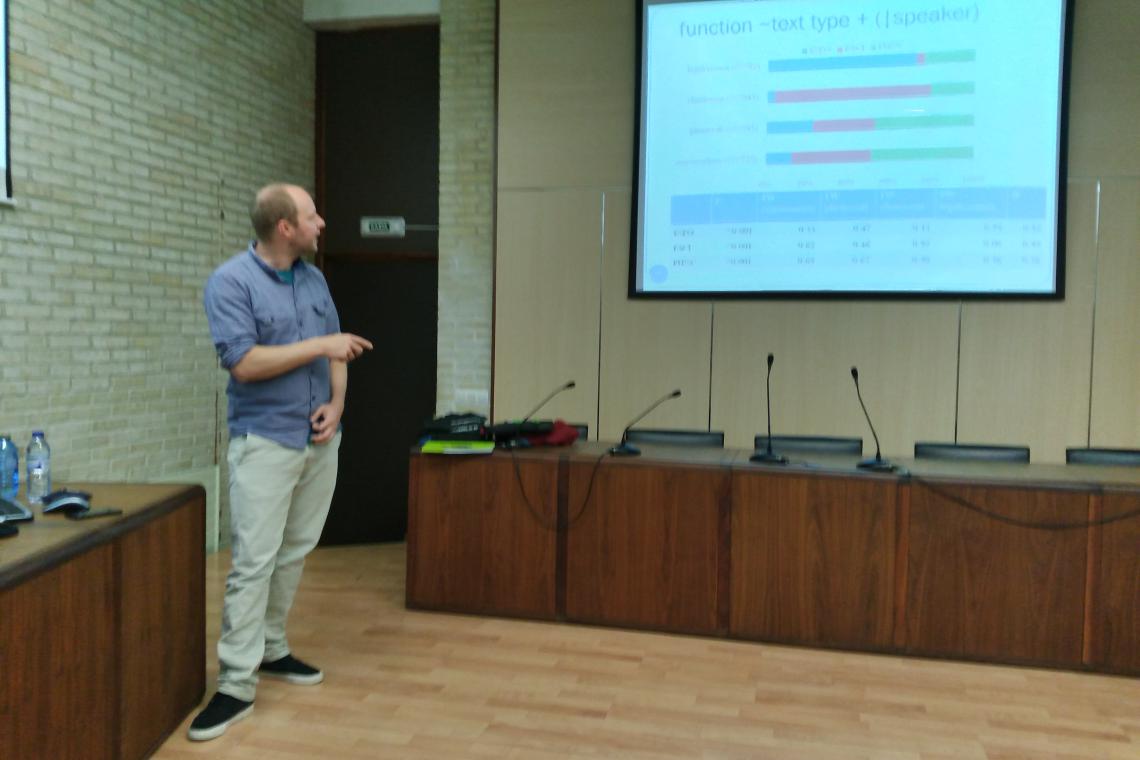On 2 October Dr. Michael Westphal, from the University of Münster, gave a seminar entitled New Englishes - New Methods, divided into two parts. Part 1 dealt with Tag questions across Englishes with a focus on text type variation, and part 2 concentrated on language attitude research with special reference to mixed methods. Thank you to all the professors, researcher and students who attended the seminar and thank you Michael for an excellent seminar! Here follows an extended abstract of the seminar.
Part1: Tag questions across Englishes: Focus on text type variation
Part 2: Language attitude research: Focus on mixed-methods
The two-part seminar highlights the methodological challenges and the potential of new or mixed-methods approaches in research on New Englishes. The first part, Tag questions across Englishes: Focus on text type variation, discusses these challenges and the potential with regard to corpus linguistics, focusing on text type. The International Corpus of English (ICE), with its growing number of matching national components and diverse text types, provides a rich tool for cross-variety analyses of New Englishes and for the description of their internal variability with regard to text type. However, most ICE-based cross-variety research does not include text type variation as most studies either pool text types together (e.g. Bernaisch 2015) or focus exclusively on informal conversations (e.g. Mair 2009; Columbus 2009). Furthermore, research on text type variation is dominated by Biber’s (1993) Multidimensional Analysis, which uses standardized grammatical and functional classes of linguistic features easily identifiable with tagging systems, and by an understanding of text type differences solely with regard to formality. This focus does not take the communicative situations of different text types earnestly and excludes many linguistic phenomena typical for New Englishes, such as the integration of L1 or creole features into Standard English usage, which are also very often not identifiable via standard taggers. These biases then potentially lead to conclusions falling short of the complexity of text type variation in New Englishes.
In my post doc-project, I want to show the importance of pragmatic variation along different text types and thus highlight alternatives to established approaches: I analyze the variation in the form and function of tag questions across different varieties of English and text types using different ICE corpora. First results from Trinidad and the Philippines show that local (Trinidadian Creole and Tagalog) tags are used more frequently in informal conversations than in more formal classroom lessons and legal cross-examinations. However, the overall frequency of tags and their function depends strongly on the communicative setting of the text type. I want to show that it is beneficial to include pragmatic variables into the canon of research on New Englishes and to take the communicative roles and needs of speakers in specific text types more earnestly.
The second part, Language attitude research: Focus on mixed-methods, gives a brief introduction to language attitude research highlighting problems of established methods with regard to research on New Englishes and then presents the results of a mixed-methods study on the perception of linguistic variation in Jamaican radio newscasts. Language attitude research usually relies on written questionnaires with closed questions, and an acontextual design to ensure generalizability. Furthermore, abstract variety labels are commonly used instead of authentic vocal renditions of linguistic variation. However, written questionnaires exclude many demographics, closed questions leave very little room for the informants to express their beliefs, and abstract variety labels are problematic in New English contexts as different language varieties are not fully enregistered. In addition, context-sensitive research designs are needed for research on New English speech communities as here the use and the attitudes toward different languages and dialects are tied to specific contexts.
One section of my PhD thesis Language Variation on Jamaican Radio (Westphal 2017) addresses the perception of linguistic variation in Standard English in Jamaican radio newscasts. For this language attitude study, I use a mix of different methods, including an accent rating study of seven authentic recordings of Jamaican newscasts, direct questions using abstract variety labels, and qualitative interviews. The accent rating study illustrates linguistic deference among the Jamaican informants toward British and American influenced English, while the results of direct questioning show loyalty toward Jamaican English. The qualitative interviews help to explain these differences: the informants did not rate the Jamaican newscasters with foreign influenced accents as speakers of British or American varieties but as very specific and especially reliable newscasters. This mix of methods shows the complexity of ideological dispositions speakers in multilingual/-dialectal speech communities live with on a daily basis. Quantitative methods need to be complemented with qualitative designs, which have the potential to show aspects not anticipated in the research design and leave more room for the users’ perspective.
References
Bernaisch, T. 2015. The lexis and lexicogrammar of Sri Lankan English. Amsterdam: John Benjamins.
Biber, D.. 1993. The multidimensional approach to linguistic analyses of genre variation: An overview of methodology and findings. Computers and Humanities 26 (5/6), 331–345.
Columbus, G. 2010. A comparative analysis of invariant tags in three varieties of English. English World-Wide 31(3), 288–310.
Mair, C. 2009. Corpus linguistics meets sociolinguistics. In T. Hoffmann & L. Siebers (Eds.), World Englishes – Problems, Properties and Prospects (pp. 39–60). Amsterdam: John Benjamins.
Westphal, M. 2017. Language variation on Jamaican radio. Amsterdam: John Benjamins.

